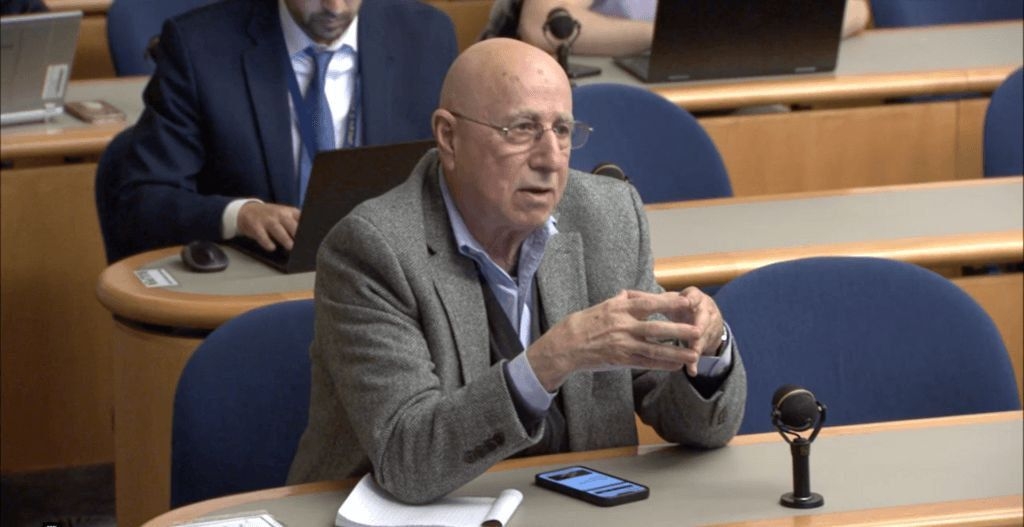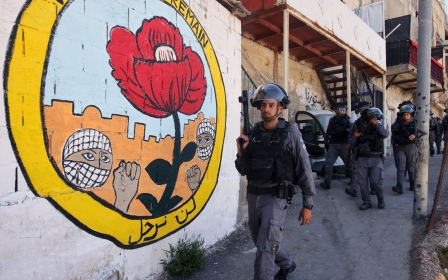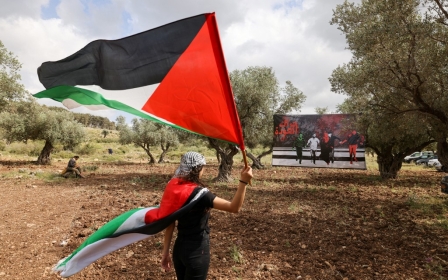Under-fire Palestinian journalist Said Arikat banned from Twitter without explanation

When Elon Musk suspended the Twitter accounts of several prominent American journalists earlier this month, the UN, EU, United States and several European governments weighed in on the matter, describing it as a threat to freedom of expression.
Reactions to the permanent suspension of the veteran Palestinian journalist Said Arikat, perhaps unsurprisingly, have been somewhat more muted.
Arikat, who served as UN spokesman in Iraq from 2005 to 2010, has been a familiar presence at the US State Department press briefings in Washington for almost 20 years.
As the Washington bureau chief for Al-Quds, one of the most-read Palestinian daily newspapers, he has constantly highlighted the Israeli occupation and the plight of the Palestinians in the US capital.
New MEE newsletter: Jerusalem Dispatch
Sign up to get the latest insights and analysis on Israel-Palestine, alongside Turkey Unpacked and other MEE newsletters
'Twitter has been an important platform for the Palestinians. It gave them space to air our grievances and to show what was happening'
- Said Arikat
"I just try to do my job and ask the questions that are pertinent. I never make up events and incidents or instigate any particular story. I simply convey what needs to be enquired about and what is the US position," he told Middle East Eye over the phone from his home in Washington.
Yet his very presence in State Department briefings has caused huge consternation among Israelis. An article by Israeli writer Yisrael Medad in the Jerusalem Post described Arikat's questioning of State Department spokesperson Ned Price, and the absence of Israeli or Jewish American media in the briefings, as a failure, claiming territory had been yielded to a pro-Palestinian journalist.
In fact, the article even included Arikat's address in the opening paragraph - an offence far more serious than the sharing of Musk's private jet location, for which the billionaire banned several journalists from Twitter.
Yet it was Arikat who was permanently suspended from Twitter on 3 December. He found out only after a friend told him that his account was no longer visible on the site.
"I received a message from Twitter telling me I have been suspended for breaking the rules. I don't know what rules they are talking about," said Arikat. In the weeks prior to his suspension, Arikat believes his account was hacked, with some of his followers receiving spam messages.
He believes that "pro-Israeli hackers" were behind it, but was quick to add that he was "speculating".
'Important platform for Palestinians'
Under Musk's chaotic new regime at Twitter, getting answers has been difficult for Arikat, whose verified account had almost 100,000 followers.
Arikat's appeals to Twitter have been met with silence. No tweets were highlighted as having broken the rules, and he's still in the dark over whether his suspension will be lifted or not.
Middle East Eye asked Twitter for comment, but received no response at the time of publication.
"Despite all the negative things people may say about Twitter, it has been an important platform for the Palestinians. It gave them space to air our grievances and to show what was happening," said Arikat.
Arikat was one of those voices, but of course he was most influential when grilling the State Department.
'I believe my suspension is directly tied to my questioning on the Palestinian issue; there's always been a campaign to silence my work'
- Said Arikat
"There are times when my colleague from the Associated Press raises questions about Palestine. But by and large, if I am not there, Palestinian issues are not raised, and events are not followed up," he said.
"If I am there, then I raise questions on Palestine, then other journalists may piggyback on that and ask questions and further clarifications."
It's those follow-up questions that prompted the Jewish News Syndicate (JNS) to write a piece earlier this month titled: "How a Palestinian journalist slanders Israel at the US State Department."
Questions raised by Arikat concerning the killing of 15-year-old Palestinian Jana Majdi Zakarneh on 12 December were described by the JNS as "libelling" Israel and using "contested" language.
Zakarneh was shot four times by Israeli forces - two bullets in the head and two in the chest. Israel called it accidental.
Ned Price called for "accountability" over Zakarneh's death in response to Arikat's questions over the killing, a rare, if tempered, rebuke of Israeli actions which made headlines.
The JNS, however, saw it as a problem that can only be remedied by getting more "Jewish media journalists to join the press briefings".
'Suppressing Palestinian voices'
Now off Twitter, Arikat says it's a major setback for his work.
"It's an important medium, especially for journalists, to speak to other journalists to get certain news across. I utilise it as a vital source for my work," he said.
When Musk was forced to reinstate the US journalists he suspended following an outcry, Arikat noted that "there was a lot of noise created" around their suspension that has not been afforded to him.
"I believe my suspension is directly tied to my questioning on the Palestinian issue; there's always been a campaign to silence my work," he said.
"You know, the mere mentioning of the word 'Palestine' is provocative and should not be mentioned."
Last week, in a similar move, Facebook suspended Arikat's newspaper Al-Quds, which has around 10 million followers. The suspension was seen as another alleged effort to censor Palestinian content.
The account has now been reinstated. However, pro-Palestinian campaigners have long believed that social media giants like Facebook have restricted or blocked pages that belonged to Palestinian journalists, activists and others on its platforms.
"There is no doubt there is an increasing intensification to silence Palestinian voices," warned Arikat.
"There is a campaign that intends to suppress Palestinian voices in any way they can. Therefore, even the most innocuous mention of the Palestinian struggle or the most innocuous mention of Israeli aggression can be viewed as problematic."
Earlier this year, Arikat saw another fellow veteran Palestinian journalist, Shireen Abu Akleh, who had worked for 25 years for Al Jazeera Arabic, shot dead by Israeli forces while covering a raid in the occupied West Bank city of Jenin on 11 May.
"I raised the issue alongside my colleagues to have some accountability for this kind of action," said Arikat.
Now more than ever, he warns, there is a need for journalists to hold the incoming far-right Israeli government accountable.
Irrespective of what his critics say, "the elephant in the room is the Israeli occupation," said Arikat.
Middle East Eye delivers independent and unrivalled coverage and analysis of the Middle East, North Africa and beyond. To learn more about republishing this content and the associated fees, please fill out this form. More about MEE can be found here.




